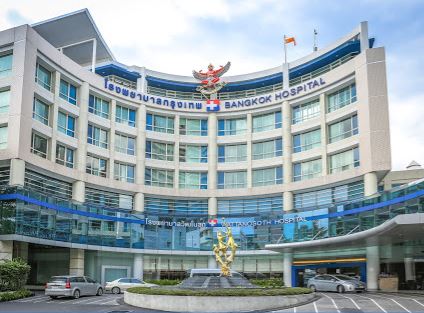
Setting the Gold Standard: Accreditation and Quality Assurance in Thai Healthcare
25 Sep, 2023
Introduction
In the realm of global healthcare, the pursuit of excellence and patient safety is of paramount importance. Thailand, renowned for its world-class medical facilities and healthcare services, has not only embraced this pursuit but has set the gold standard for accreditation and quality assurance in healthcare. Accreditation systems and rigorous quality control measures in Thailand are not just benchmarks; they are a testament to the nation's commitment to delivering exceptional healthcare. In this article, we explore how Thailand has established itself as a leader in healthcare accreditation and quality assurance, and how these initiatives contribute to its reputation as a top destination for medical care.
A. The Significance of Accreditation and Quality Assurance
Accreditation and quality assurance are fundamental to the delivery of high-quality healthcare services and patient safety. These processes serve several critical purposes:
Transform Your Beauty, Boost Your Confidence
Find the right cosmetic procedure for your needs.

We specialize in a wide range of cosmetic procedures

1. Ensuring Patient Safety:
a. Minimizing Medical Risks for Safer Care
Accreditation and quality assurance measures are designed to minimize the risk of medical errors, adverse events, and patient harm.
2. Elevating Standards:
a. Driving Excellence through Best Practices
They encourage healthcare providers to adhere to industry best practices and continuously improve their services, raising the overall standard of care.
3. Boosting Public Confidence:
a. Accreditation's Role in Gaining Patient Confidence
Accreditation demonstrates a commitment to excellence, earning the trust and confidence of patients, both domestic and international.
4. Attracting Medical Tourists:
a. Quality Care as an Economic Driver
High-quality healthcare services draw medical tourists, contributing significantly to a country's economy and reputation.
B. Thailand's Commitment to Healthcare Excellence
Thailand's commitment to excellence in healthcare is evident through its comprehensive accreditation and quality assurance programs:
1. Thai Health Foundation (THF):
a.Advancing Quality Across Healthcare Facilities
The Thai Health Foundation plays a pivotal role in advancing healthcare quality and safety in the country. It provides accreditation and certification to healthcare providers, ensuring they meet stringent quality standards. THF's programs cover a wide range of healthcare facilities, from hospitals and clinics to dental practices and rehabilitation centres.
Most popular procedures in
Total Hip Replacemen
Upto 80% off
90% Rated
Satisfactory

Total Hip Replacemen
Upto 80% off
90% Rated
Satisfactory

Breast Cancer Surger
Upto 80% off
90% Rated
Satisfactory

Total Knee Replaceme
Upto 80% off
90% Rated
Satisfactory

Total Knee Replaceme
Upto 80% off
90% Rated
Satisfactory

2. JCI Accreditation:
a. Global Recognition of Exceptional Standards
Many Thai hospitals and healthcare institutions voluntarily seek accreditation from renowned international bodies, such as the Joint Commission International (JCI). JCI accreditation is considered a gold standard worldwide and signifies compliance with rigorous quality and patient safety standards.
3. Hospital Accreditation:
a. Government-Led Quality Assessments
The Thai government has established the Hospital Accreditation (HA) program to evaluate and accredit public and private hospitals based on standards developed by the Ministry of Public Health. The program focuses on patient safety, infection control, clinical practices, and overall healthcare management.
4. ISO Certification:
a. Quality Assurance through International Standards
Thai healthcare facilities often pursue ISO certifications related to healthcare quality, such as ISO 9001 (Quality Management System) and ISO 15189 (Medical Laboratories). These certifications highlight their commitment to providing high-quality care.
C. Unique Aspects of Accreditation and Quality Assurance in Thailand
1. Cultural Sensitivity:
a. Caring with Respect for Diverse Backgrounds
Thailand's healthcare providers are known for their cultural sensitivity and compassionate care. Accreditation and quality assurance programs in the country also emphasise cultural competence, ensuring that patients from diverse backgrounds receive respectful and considerate treatment.
2. Patient-Centred Care:
a. Putting Patients at the Heart of Healthcare
Accreditation standards and quality assurance measures in Thailand prioritize patient-centered care. They encourage healthcare providers to involve patients in treatment decisions, respect their preferences, and enhance the patient experience.
3. Continuous Improvement:
a. Pursuing Excellence through Ongoing Growth
Thailand's healthcare system encourages continuous improvement. Healthcare providers regularly participate in training, quality improvement projects, and peer reviews to ensure that their practices align with the latest medical advancements and best practices.
4. Transparency and Accountability:
a. Empowering Patients with Information
Accreditation and quality assurance programs in Thailand promote transparency and accountability in healthcare. Patients have access to information about the accreditation status and quality measures of healthcare facilities, empowering them to make informed choices.
D. The Impact on Medical Tourism
Thailand's commitment to accreditation and quality assurance in healthcare has had a profound impact on its medical tourism industry:
1. International Attraction:
Medical tourists from around the world are drawn to Thailand because of its reputation for high-quality healthcare. Accreditation and quality assurance provide assurance of consistent excellence.
2. Increased Revenue:
The medical tourism sector significantly contributes to Thailand's economy, generating substantial revenue through foreign patients seeking medical treatment.
3. Medical Excellence:
Thailand's dedication to quality assurance and accreditation bolsters its position as a global hub for medical excellence. Patients seek Thai healthcare for complex procedures and specialised care.
4. Word-of-Mouth Recommendations:
Positive experiences of medical tourists who have received care in Thailand often lead to word-of-mouth recommendations, further bolstering the country's reputation.
E. Success Stories of Accreditation in Thailand
The success stories of healthcare facilities and institutions in Thailand that have achieved accreditation and excelled in quality assurance are a testament to the country's commitment to excellence:
1. Bumrungrad International Hospital

- Bumrungrad, accredited by JCI, is a world-renowned healthcare institution in Thailand.
- It consistently ranks among the top hospitals globally and has attracted patients from over 190 countries.
- Established on 17 September 1980, the Bumrungrad International Hospital, Bangkok is a global pioneer in giving the best international standard healthcare services.
- It is a tertiary care hospital having over 45 Centres and Clinics namely, Arrhythmia Centre, Breast Centre, Bumrungrad Robotic Surgery Centre, Children`s (Paediatric) Centre, Diagnostic Radiology & Nuclear Medicine, Digestive Disease (GI) Centre, Fertility Centre & IVF Clinic, Heart (Cardiology) Centre, Orthopaedic Centre, Plastic (Cosmetic) Surgery Centre, Spine Institute and many more.
- It is the only hospital in Thailand using next-generation sequencing (NGS) technology. It offers many Health Packages under various departments like Mammogram and Breast Ultrasound packages, Arthroscopic Knee Surgery Packages, and Heart Disease Screening packages to mention a few.
2. Samitivej Hospitals

- Samitivej Hospitals, with multiple JCI-accredited locations, have received international acclaim for their high-quality care and patient-focused services.
- One of the first private hospitals in Thailand opened its doors on February 25, 1977, on Sukumvit Road.
- It began operating on its basic principles, which centre around service quality, and was appropriately named Sukumvit Hospital.
- The hospital's history can be traced back to when it served as an army hospital during the war, going by the name "Fifth Field Hospital.
- At that time, the hospital already had modern amenities and equipment because American soldiers who returned home after the war had left them behind.
3. BNH Hospital

- BNH Hospital, an HA-accredited facility, has a long history of providing exceptional healthcare services to both local and international patients, emphasizing personalized care and innovative treatments.
- Since then more than 100 years have gone by, and these days BNH Hospital is now internationally recognized as being The First Private International Hospital with international standards of Western medicine in the kingdom of Siam for 6 reigns.
- Despite the passage of time, BNH Hospital has retained its identity.
- That extra special touch has been handed down from generation to generation, as well as medical expertise, especially in maternity care, pediatrics, and gynecology.
- From the past to the present, BNH has always been the forefront of midwifery care in the Kingdom of Thailand.
4. Bangkok Dusit Medical Services:
- Bangkok Dusit Medical Services, with a portfolio of JCI-accredited hospitals, is committed to excellence in healthcare delivery and continues to expand its international patient services.
- Bangkok Hospital Medical Provider and Leading Medical Treatment in Thailand With pride for more than 49 years.
- it can be considered as one of the leading private hospitals in Thailand.
- That has gained the trust of both Thai people And foreigners who choose to use diagnosis, treatment, and rehabilitation services all along It has been accredited by the Joint Commission International (JCI), the world's largest medical standardization body.
Conclusion
Accreditation and quality assurance are the cornerstones of healthcare excellence and patient safety. Thailand's unwavering commitment to these principles has elevated the country to a position of prominence in the global healthcare landscape. By setting the gold standard through accreditation programs, adherence to international benchmarks, and a dedication to continuous improvement, Thailand has not only attracted medical tourists but also earned the trust and confidence of patients worldwide. Thailand's journey towards healthcare excellence is a shining example of how commitment to quality transforms a nation into a global leader in healthcare.
Wellness Treatment
Give yourself the time to relax
Lowest Prices Guaranteed!

Lowest Prices Guaranteed!
